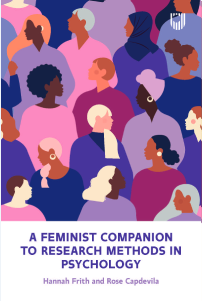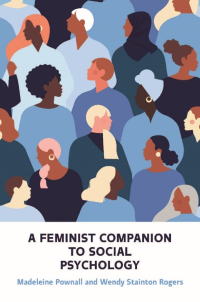The Feminist Companion series is motivated by a desire to make sure that the thriving field of academia relating to feminist psychology is being made accessible to those who are new to the field (i.e. undergraduate students), thus ensuring that exciting developments receive the maximum possible coverage, as well as the best chance of shaping the thoughts of the psychology academics and practitioners of the future.
On the one hand, the forefront of feminist psychology is constantly advancing. On the other hand, it is still possible for students to complete a full undergraduate degree in Psychology without considering anything to do with the subject. This series aims to bridge that gap, providing short, snappy, pedagogically informed books that sit alongside – as well as complement, complicate, and contest – psychology textbooks and courses. They aim to engage undergraduate psychologists, ground them in a feminist analysis of our discipline’s history and show how academic work might speak to their values, their activism, or help them make sense of their experiences. This series celebrates the fun, fierce, fabulous, and wonderful things that feminism has to offer to psychology.
All titles in the series map to the British Psychological Society (BPS) curriculum as well as the Quality Assessment Agency’s (QAA) Subject Benchmark Statement for Psychology.
A Feminist Companion to Developmental Psychology
This companion equips you to question and re-evaluate what you think you know about attachment, developmental disability, neurodiversity, and a range of other formative childhood and individual development experiences, all through a feminist lens. In doing so, it makes the case for an intersectional approach to developmental psychology that considers how the different aspects of who we are influence our development.
Key features include:
- Five Reasons Why You Need a Feminist Companion – a helpful guide to what readers can expect to gain from this book
- Activity boxes, suggesting ways you can put the theory you are learning into practice
- See and Hear for Yourself boxes, signposting readers to where they can find real-world examples of the concepts covered
- Summary sections that articulate the main points of each chapter and provide a useful revision aid
- A glossary of key terms
About the authors:
Charlotte Dann
Charlotte is Senior Lecturer in Psychology at the University of Northampton, UK. Charlotte specialises in critical feminist qualitative research, exploring topics such as tattooed bodies, family life online and girlhoods.
Lindsay O'Dell
Lindsay is Professor of Critical Developmental Psychology at The Open University, UK. Lindsay has worked on projects that have examined the health, development and social care of children and families, particularly focussing on children who are seen to be ‘different’ in some way.
A Feminist Companion to Conceptual and Historical Issues in Psychology
This companion offers crucial support for anyone embarking on a feminist journey through Psychology’s past and present. It offers a uniquely critical, inclusive and affirmative approach to understanding gender in Conceptual and Historical Issues in Psychology (CHIP). By accessibly presenting knotty and entangled topics, this book promises to ignite your curiosity and get you asking questions.
Key features include:
- Five Reasons Why You Need a Feminist Companion – a helpful guide to what readers can expect to gain from this book
- Learning objectives to tell you what the chapter will cover and how it relates to what you’ve learned so far
- Key questions to help put the theory you are learning into practice
- Summary sections that articulate the main points of each chapter and provide a useful revision aid
- A glossary of key terms
About the authors:
Katherine Hubbard
Katherine is a Senior Lecturer at the University of Surrey, UK. Her research and teaching are interdisciplinary, including psychological, historical and sociological components which focus on gender, sexuality and queer studies. She takes an affirmative and inclusive approach and specialises in queer feminist histories of Psychology.
Peter Hegarty
Peter is a Professor of Psychology at the Open University, UK. He is a social psychologist and historian-psychologist who has often argued that human behaviours deemed intelligent, such as language, scientific thinking, and moral reasoning, are invidiously shaped by gender, sexuality and sex norms beyond psychologists’ awareness.
A Feminist Companion to Research Methods in Psychology
This companion offers a better-informed understanding of research methods, exploring key topics such as ethics, reproducibility, reliability and validity, and research design through a feminist lens. The ethics of research relationships are explored, alongside issues to do with prejudices and biases implicated in psychology’s treatment of women.
Ultimately, this book aims to develop your critical and analytical skills by encouraging a questioning approach to understanding how psychological knowledge is produced, and by offering alternative, feminist-informed approaches to framing research questions, adopting data collection techniques, and analysing and interpreting data.
Key features include:
- Five Reasons Why You Need a Feminist Companion – a helpful guide to what readers can expect to gain from this book
- Activity boxes, suggesting ways you can put the theory you are learning into practice
- See and Hear for Yourself boxes, signposting readers to where they can find real-world examples of the concepts covered
Summary sections that articulate the main points of each chapter and provide a useful revision aid - A glossary of key terms
About the authors:
Hannah Frith
Hannah is Principal Teaching Fellow at The University of Surrey, UK. Her research focuses on body image, as well as critical explorations of women’s experiences of sex and sexuality.
Rose Capdevila
Rose is Senior Lecturer in Psychology at The Open University, UK, current Chair Elect of the BPS Psychology of Women & Equalities Section (POWES), and Co-Editor of the journal Feminism & Psychology.
A Feminist Companion to Social Psychology
This companion offers a feminist, critical, better-informed understanding of social psychology; what it knows, what it can deliver – and what it can’t. Ultimately, it will help you gain a deeper understanding of the data, analytic tools and theoretical frameworks that inform Social Psychology, as well as empowering you to develop the capacity and authority to challenge assumptions and become a critical and engaged social psychologist.
Key features include:
- Five Reasons Why You Need a Feminist Companion – a helpful summary of what readers can expect to gain from this book
- Activity boxes, suggesting ways you can put the theory you are learning in to practice
- See and Hear for Yourself boxes, signposting readers to where they can find real-world examples of the concepts covered
- Summary sections that articulate the main points of each chapter and provide a useful revision aid
- A glossary of key terms
Winner of the 2023 BPS Book Award in the Textbook Category

About the authors:
Wendy Stainton Rogers
Wendy is Emeritus Professor at The Open University, UK, and a member of the Open University Press Editorial Advisory Board. Across her career she has written ten bestselling books, the majority of which are for Psychology students. She is renowned for her clear-sighted and accessible writing style, as well as for her innovative work in Critical Psychology.
Madeleine Pownall
Madeleine is an Associate Professor in Psychology, at the University of Leeds, UK. She is Chair of the Psychology Postgraduate Affairs Group (PsyPAG) and an Associate Editor at The Psychologist.
Praise for the series
Interested in Contributing?
If you are interested in learning more about or contributing to the series please get in touch.
You can contact us here:
Sarah Riley - s.riley@massey.ac.nz
Rose Capdevila - rose.capdevila@open.ac.uk




